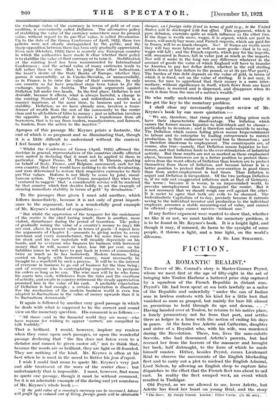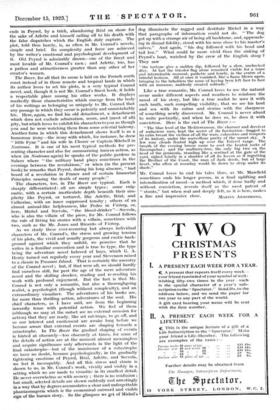FICTION.
A ROMANTIC REALIST.
TuE Rover of Mr. Conrad's story is Master-Gunner Peyrol, whom we meet first at the age of fifty-eight in the aet of bringing into Toulon Harbour a battered prize ship captured by a squadron of the French Republic in distant seas. Peyrol's life had been spent at sea both lawfully as a sailor of the Republic and unlawfully " under the sun of Indian seas in lawless contests with his kind for a little loot that vanished as soon as grasped, but mainly for bare life almost as precarious to hold through its ups and downs. . . ." Having handed over at Toulon, he returns to his native place, a lonely promontory not far from that port, and settles there as lodger in a farm with the notion of ending his days in peace. At the farm live Arlette and Catherine, daughter and sister of a Royalist who, with his wife, was murdered during the Revolution. There, too, lives the sans-culotte Scevola, who had denounced Arlette's parents, but had rescued her from the horrors of the massacre and brought her back, half distraught, to the farm of which he made himself master. Hither, besides Peyrol, comes Lieutenant Real to observe the movements of the English blockading fleet and to carry out a plot to mislead the English Admiral, Lord Nelson, by allowing an English sloop to capture false dispatches to the effect that the French fleet was about to sail east. In reality the fleet escaped west, an event which resulted in Trafalgar.
Old Peyrol, as we are allowed to see, loves Arlette, but Arlette has fixed her heart on young Real, and the story
• The Rover. By Joseph Conrad, London: Fisher Unwin. [7s. 6d. net.]
ends in Peyrol, by a trick, abandoning Real on shore for the sake of Arlette and himself sailing off to his death with the false dispatches which the English duly capture. The plot, told thus barely, is, as often in Mr. Gonad's novels, simple and .brief. Its complexity and force are achieved by the writer's emotional and. psychological development of it. Old Peyrol is admirably drawn—one of the finest and most lovable of Mr. Conrad's men ; and Arlette, too, has a pathos and attractiveness greater than any other of her creator's women.
The Rover, for all that its scene is laid on the French south coast instead of in those remote and tropical lands in which its author loves to set his plots, is a very typical Conrad novel, and, though it is not Mr. Conrad's finest book, it holds a respectable place among his other works. It displays markedly those characteristics which emerge from the body of his writings as belonging so uniquely to Mr. Conrad that any passage in which they occur is patently and unmistakably his. Here, again, we find his old detachment, a detachment which does not exclude admiration, scorn, and (most of all) pity, but which loves to exhibit his characters to you as though you and he were watching them from some celestial balcony.
Another form in which this detachment shows itself is as a humorous irony—the irony with which, for instance, he drew " little Fyne " and his wife in Chance or Captain Mitchell in Nostromo. It is one of his most typical methods for pre- senting character and also for summarizing human action, as when (in Nostronto again) he speaks of the public gardens in Sulaco where " the military band plays sometimes in the evenings between the revolutions," or when (in the present book) he remarks that Peyrol, during his long absence, " had heard of a revolution in France and of certain Immortal Principles causing the death of many people."
The characters, too, in The Rover are typical. Each is sharply differentiated :.all are simple types ; some enig-
matic, with a certain inarticulate depth beneath their sim- plicity like Peyrol, or tortured, like Arlette, Real, and Catherine, with an inner suppressed tensity ; others of an almost animal-like helplessness, like Pedro in Victory, or, here, Michel and Scevola, " the blood-drinker "—Scevola, who is also the villain of the piece, for Mr. Conrad follows the rule of fitting his stories with a villain, sometimes with two, such as the Mr. Jones and Ricardo of Victory.
As we study these ever-recurring but always individual characters of Mr. Conrad's, the stress and growing tension of his plots, the vivid and usually gorgeous and exotic back- ground against which they unfold, we perceive that he writes in a familiar convention and is true to type, the type being the adventure novel beloved of boys, which G. A.
Henty turned out regularly every year and Stevenson raised to a classic in Treasure Island. That is certainly the ancestry
of the Conrad novel ; but, if that were all, we should hardly find ourselves still, far past the age of the mere adventure novel and the shilling shocker, reading and re-reading his work with profound enjoyment. But the fact is that Mr. Conrad is not only a romantic, but also a thoroughgoing realist, a psychologist (though without complexity), and an extraordinary visualizer. The adventures of his books are, far more than thrilling action, adventures of the soul. His chief characters, as I have said, arc from the beginning inwardly tense with potential action. We feel of them (although we may at the outset see no external occasion for action) that they arc ready, like set rat-traps, to go off, and so our interest and excitement are awake long before we become aware that external events are shaping towards a catastrophe. In The Rover the gradual shaping of events is hinted at obscurely—too obscurely at times, for some of the details of action are at the moment almost meaningless and acquire significance only afterwards in the light of the final catastrophe—but of the imminence of a catastrophe we have no doubt, because psychologically, in the gradually tightening emotions of Peyrol, Real, Arlette, and Scevola, we feel it inescapably. And all this stress and strain is shown to us, in Mr. Conrad's work, vividly and visibly in a setting which we are made to visualize in its smallest detail. He never overwhelms us with scenery ; there is no confusion ; but small, selected details are shown suddenly and arrestingly in a way that by degrees accumulates a clear and unforgettable phantasmagoria which is the economical outward and visible sign of the human story. So the glimpses we get of Michel's dog illuminate the ragged and destitute Michel in a way that paragraphs of information could not do. " The dog got up with a strange air of being all backbone, and, approach- ing in dismal fidelity, stood with his nose close to his master's calves." And again, " his dog followed with his head and tail low." What could be more vivid than the sinking of Peyrol's boat, watched by the crew of the English sloop ? They saw " the tartane give a sudden dip, followed by a slow, unchecked dive. At last the tricolor flag alone remained visible for a tense and interminable moment, pathetic and lonely, in the centre of a brimful horizon. All at once it vanished, like a flame blown upon, bringing to the beholders the sense of having been left face to face with an imniense, suddenly created solitude."
Like a true romantic, Mr. Conrad loves to use the natural scene under different aspects and weathers to reinforce the mood of his story, but like a true realist he uses it with such truth, such compelling visibility, that we see his land and sea with its calms and storms with the sharpness of something newly discovered. Mr. Conrad is never afraid to write poetically, and when he does so, he does it with conviction. Here is the end of The Rover :-
" The blue level of the Mediterranean, the charmer and deceiver of audacious men, kept the secret of its fascination—hugged to its calm breast the victims of all the wars, calamities and tempests of its history, under the marvellous purity of the sunset sky. A few rosy clouds floated high up over the Esterel range. The breath of the evening breeze came to cool the heated rocks of Escampobar ; and the mulberry-tree, the only big tree on the head of the peninsula, standing like a sentinel ut the gate of the yard, sighed faintly in a shudder of all its leaves as if regretting the Brother of the Coast, the man of dark deeds-. but of large heart, who often at noonday would lie down to sleep under its shade."
Mr. Conrad loves to end his tales thus, as Mr. Masefield sometimes ends his longer poems, in a final uplifting and intensification of mood—a method which, if done badly and without conviction, reveals itself as the most patent of " stunts," but when real and deeply felt, as it is here, makes



















































 Previous page
Previous page